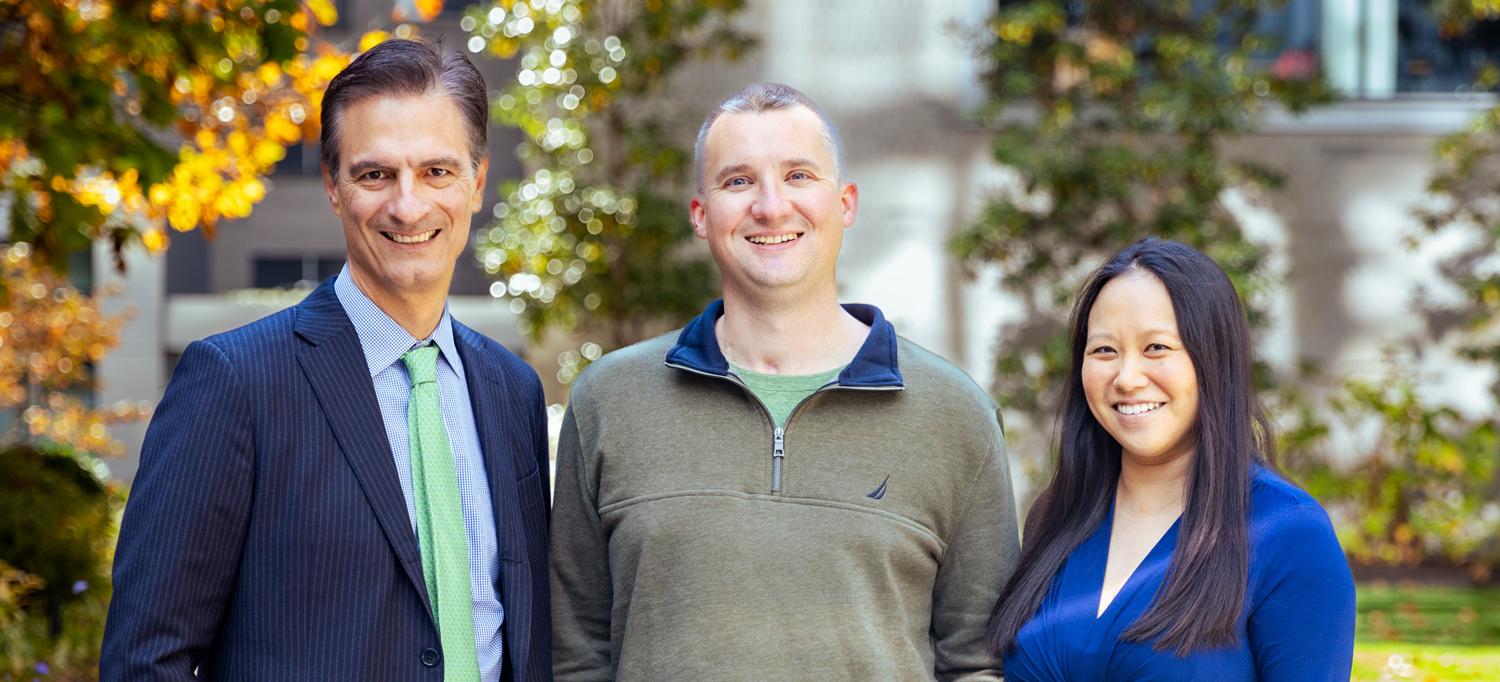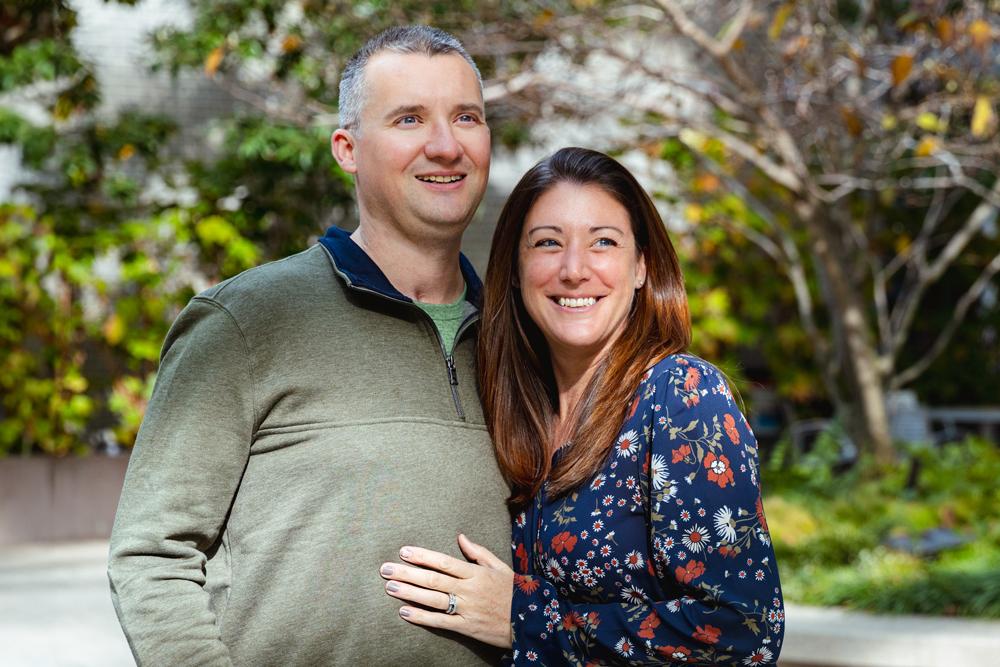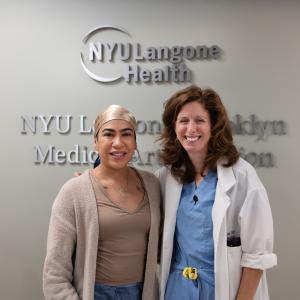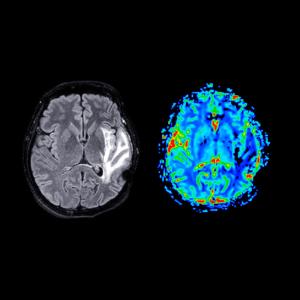
After only four days on the transplant waitlist, Connecticut dad Michael Serke received lifesaving lung and liver transplants at NYU Langone, performed by an expert care team including Dr. Luis F. Angel and Dr. Stephanie H. Chang.
Photo: NYU LANGONE STAFF
Michael Serke was a shadow of his former self when Luis F. Angel, MD, first met him on June 16, 2022.
Serke had lost 100 pounds from his 6-foot, 220-pound frame. He relied on extracorporeal membrane oxygenation (ECMO), a life-support device, to breathe. When he spoke, his words came out in gasps.
Just six months before, Serke had been an active, 38-year-old father of three young children. But in December 2021, he tested positive for COVID-19. Within a week, he was in an ambulance and heading to the hospital, struggling to breathe. Ten days later, Serke was placed on a ventilator, and later ECMO, and put into a medically induced coma.
When Dr. Angel, the medical director of lung transplantation at the NYU Langone Transplant Institute, got the call requesting a consult at Yale New Haven Hospital, he got in his car and drove to Connecticut. There was still a chance Serke’s lungs could recover, so Dr. Angel advised weaning him off ECMO and mechanical ventilation. “If the lungs can recover enough to avoid a lung transplant, that’s the best alternative,” Dr. Angel says.
Initially, the strategy worked. Serke was taken off ECMO completely within two weeks, with reduced ventilator support. A month later, he was transferred to a Connecticut rehabilitation hospital. Still, taking short daily walks down the hallway there required supplemental oxygen and more effort than Serke could muster. “The physical therapist kept urging me to get up and move more and I kept saying, ‘I can’t breathe,’” Serke says. “My lungs felt like a container of phlegm.”
VIDEO: Transplant specialists Dr. Luis F. Angel and Dr. Karim J. Halazun and Michael Serke and his family share Michael's lifesaving transplant and recovery journey.
Then came a desperate night when he struggled to breathe after one of his lungs collapsed. Serke was convinced he had only one hope of ever going home to his family again: Dr. Angel.
“That’s when I gave the rehabilitation hospital Dr. Angel’s phone number,” Serke says. “I just knew I was never going to leave the hospital unless I got a lung transplant.”
A Spot on the Transplant List Renews Hope
NYU Langone is ranked top in the nation for excellent transplant survival, fast transplant rates, and low mortality. “Because of our expertise and experience with so many COVID-19 patients at NYU Langone, I often traveled to surrounding hospitals to offer recommendations for treating their patients with COVID who are in critical condition who may qualify for a lung transplant,” Dr. Angel says.
“It was such a good feeling knowing somebody else was out there who could help potentially solve my problem, which was my failing lungs,” Serke says.
During Serke’s evaluation for a lung transplant at NYU Langone, Dr. Angel and the transplant team made a new discovery: Not only had the COVID-19 virus scarred Serke’s lungs beyond repair, it had also damaged his liver.
“Inflammation from the COVID-19 virus can damage the arteries around the bile ducts, and the bile ducts just die,” says Karim J. Halazun, MD, surgical director of NYU Langone’s Liver Care and Transplant Program. This process is known as COVID cholangiopathy.
Serke’s best hope for survival was a combined lung and liver transplant, which is uncommon. Only two such operations had been performed at NYU Langone in 2022.
On Monday, September 26, 2022, Serke was placed on the organ transplant list. He and his wife, Megan, mentally prepared to wait weeks or even months for a donor match. Such patience was not required: just four days later, on that Friday, he had a liver and double-lung transplant, with organs from the same donor.
“NYU Langone has one of the fastest transplant programs in the country, with an average list to transplant time of less than 45 days,” Dr. Angel says. “But we have transplanted many people the same day or two to three days after listing. It’s not unusual for NYU Langone, but it is for the rest of the country.”
The technically complex double-organ transplant surgery lasted more than 14 hours, with Stephanie H. Chang, MD, surgical director of lung transplant at the NYU Langone Transplant Institute, leading the lung transplant team, followed by Dr. Halazun and his team, who performed the liver transplant surgery.
A day after waking up from the procedure, when Serke was no longer on a ventilator, he had a revelation: “It was the first time after almost a year that I could breathe without feeling like I was drowning. It was indescribable,” he says.
Nearly a Year Later, a Homecoming
After spending several weeks at NYU Langone’s Rusk Rehabilitation, Serke finally went home for good, on November 24, 2022: home in time for Thanksgiving, and almost one year since his COVID-19 experience began.
Every day since then has been the greatest gift.
“I got my chance to go home to be with my family and start to live a normal life again,” says Serke, now 40.
Serke, who is back to work part-time, enjoys spending time just hanging out with Megan and the kids: Madison, 9, Cora, 7, and Owen, 5, and playing soccer together in the backyard with their new dog, Sadie.
“We can’t thank everyone at NYU Langone enough,” says Megan, who served as an advocate and was by her husband’s side every day throughout his course of illness. “Without Dr. Angel and Dr. Halazun, I wouldn’t have my husband, and our children wouldn’t have their father. We will always be grateful for them and their medical teams.”


